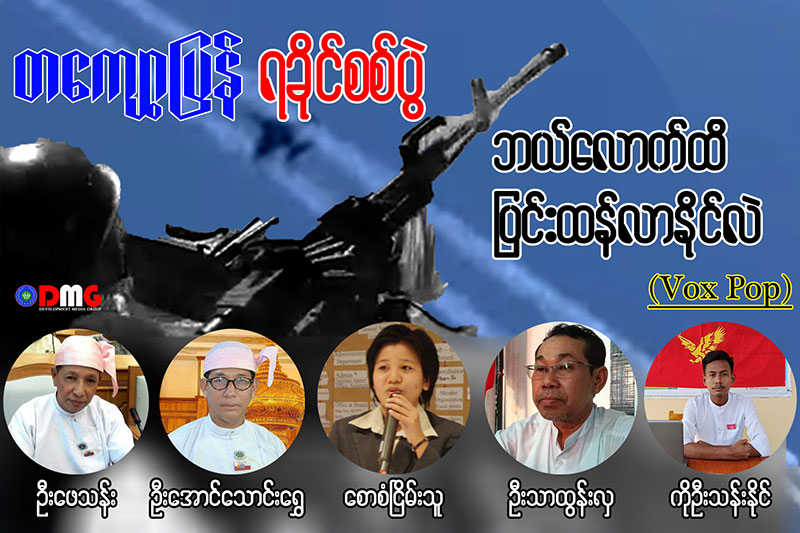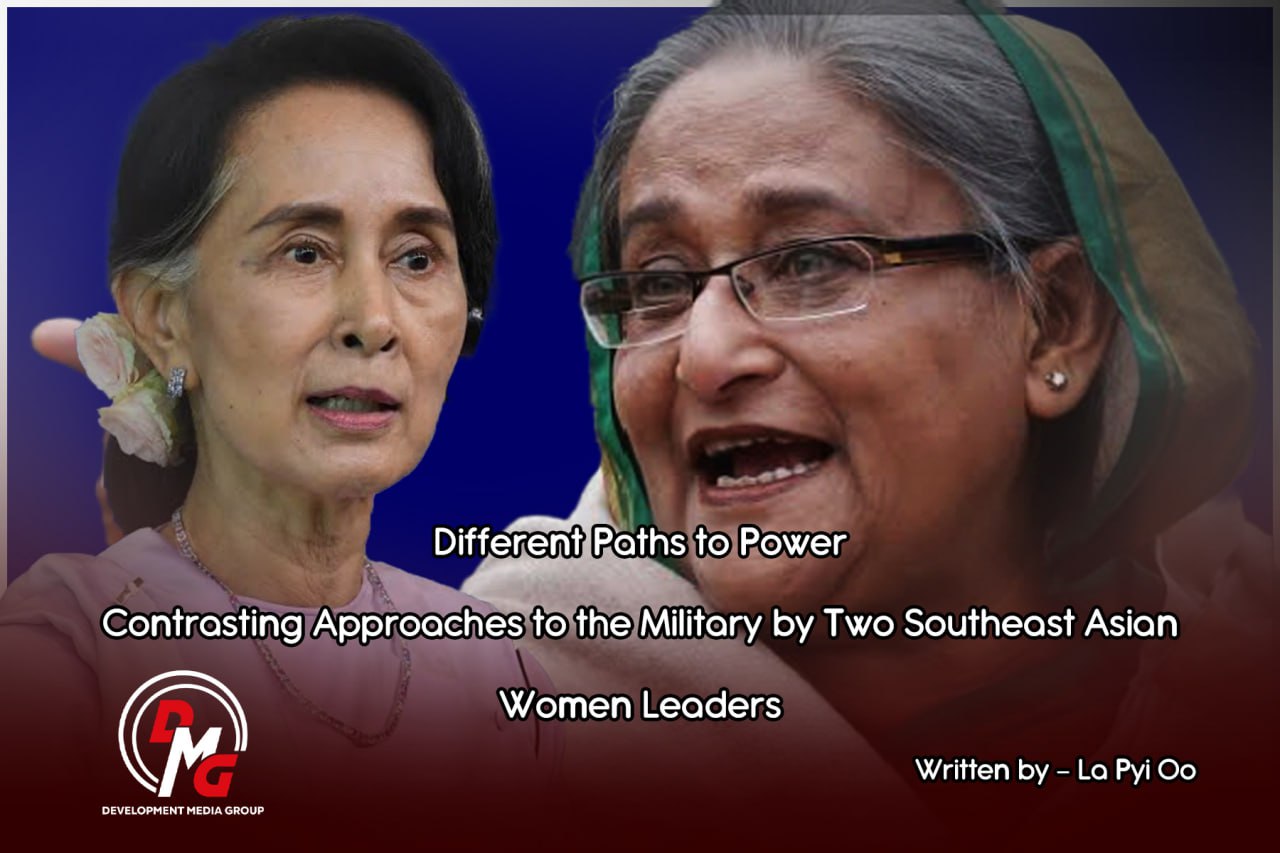Vox Pop: Do increasingly frequent clashes in Arakan presage all-out war once more?
Military tensions are running high across various parts of Arakan State as clashes have continued for about a month in Maungdaw and Paletwa townships. In the latest escalation to date, the regime on Saturday carried out airstrikes in Maungdaw Township as it attempted to retake a border guard police outpost near the Myanmar-Bangladesh border, which the Arakan Army occupied on August 31.
03 Sep 2022

DMG Newsroom
3 September 2022, Sittwe
Renewed fighting between the Myanmar military and the Arakan Army (AA) in Arakan State has spread to Maungdaw, Rathedaung, Mrauk-U and Taungup townships, as well as neighbouring Paletwa Township, Chin State.
Military tensions are running high across various parts of Arakan State as clashes have continued for about a month in Maungdaw and Paletwa townships. In the latest escalation to date, the regime on Saturday carried out airstrikes in Maungdaw Township as it attempted to retake a border guard police outpost near the Myanmar-Bangladesh border, which the Arakan Army occupied on August 31.
With much of the region on edge, DMG sought out the opinions of those on the ground in Arakan State, asking whether they think the conflicting sides can de-escalate or if, instead, a return to all-out war looks more likely.
U Pe Than || Former Lower House Lawmaker
The two sides had been warning each other before clashes broke out. [Junta spokesman] Major General Zaw Min Tun threateningly told the AA not to blame it [the Myanmar military] if fighting did happen. The AA also told people that clashes could happen at any time because the Myanmar military was interfering in its administrative and judicial mechanisms.
The two sides arrested each other’s personnel, which finally resulted in clashes in Paletwa, Maungdaw, Rathedaung and lately Taungup and Ann. From those clashes, we can conclude that there is no negotiation between the two sides. If there had been negotiations, the two sides could have stopped fighting like they did before. So, we can conclude that there was no negotiation. So, fierce clashes happened.
The AA has attacked border guard police in particular, which I think is because they want to control the border region. The military regime does not want to let go of its border guard police bases.
Without negotiations, the fighting could spread across Arakan State, including the southern part. Under such circumstances, needless to say, more people will be displaced, and there will be more civilian casualties. If there are no negotiations, fighting will spread to other parts and will only escalate.
U Aung Thaung Shwe || Former Lower House Lawmaker
Whether clashes will intensify largely depends on the military regime. If the military carries out attacks on AA-controlled areas, clashes may intensify. As the regime has used aircraft, it is likely that clashes can intensify to a certain extent. Arakanese people have their previous experiences when it comes to clashes, and attacks from both the Navy and Air Force of the Myanmar military. The AA has also urged people in Arakan State to make preparations, stockpile food, and make bomb shelters.
How the military views people in Arakan State in its fighting with the AA will also play a factor. It will not seriously impact the people if the military fights in line with the Geneva Conventions and international laws. But the military has carried out deliberate attacks on civilians. Civilians have been killed and injured in those attacks. If that happens again, the fighting will escalate further.
Saw San Nyein Thu || Chairwoman || Rakhaing Women’s Initiative Organization
I think the renewed fighting will escalate further. Arakan State is widely viewed as being relatively stable since the Spring Revolution broke out. There could be external factors that could lead to fighting in Arakan State. And the fresh fighting could be worse than the previous [fighting].
Currently, fierce clashes have been taking place in Maungdaw, Rathedaung, Kyauktaw, Mrauk-U and so on. And clashes could spread to other places. And I heard from people that there have been reinforcements sent into the area. Under such circumstances, clashes could further intensify. There is still no sign of negotiation between the AA and the military regime. They are only prepared to fight each other.
U Tha Tun Hla || Chairman || Arakan National Party
If negotiations between the two sides do not go well, the fighting may intensify. What is currently happening in the political process of Myanmar is that since independence, there has been no sign of successful negotiation and no successful action. So now, as before, if the negotiations fail, I foresee more fighting.
Therefore, if there is no political culture to find a solution to the problems of Myanmar politically, the fighting will become more intense. In Myanmar, ethnic peoples do not have equal rights politically, economically, racially; and so they have to join the armed forces. Therefore, if the fighting in Arakan State is likely to intensify, if there is more military activity on both sides, I see that if we do not find a solution through discussion, there will be more fighting.
According to the reports, both the Myanmar military and AA are preparing for war.
Ko Oo Than Naing || Information Officer || Arakan Students’ Union
After the military coup, it is no longer convenient to solve problems through political means. Ethnic armed groups are increasingly relying on armed means to solve problems and demand the rights they deserve. Fighting has been ongoing in Arakan State and civilian casualties were reported in clashes between the AA and Myanmar military in Maungdaw and Paletwa in Chin State. Maungdaw is an area that shares a border with Bangladesh, so the AA started trying to control the Maungdaw area. Therefore, it is considered that there may be clashes between the AA and the Myanmar military in other areas.
The military junta foolishly said the Arakanese people would suffer if they supported the AA. This is why the fighting in Arakan State has escalated. The military council has interfered with the AA’s judicial sector in Arakan State. The Myanmar military arrested some civilians on suspicion of having ties to the AA. In response, the AA detained some junta soldiers and police.
I see that the fighting could get worse. The anti-regime forces and ethnic armed groups are fighting against the military to topple the regime. The military council is in a state of exhaustion in facing all fronts militarily and politically. Because the AA can attack the military in a more pressured manner, we see that the situation in Arakan state could be worse than the war that happened circa 2019.





.jpg)














